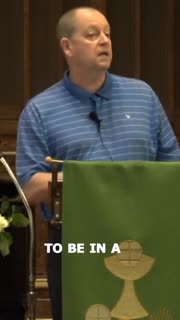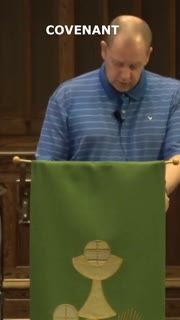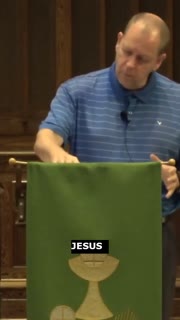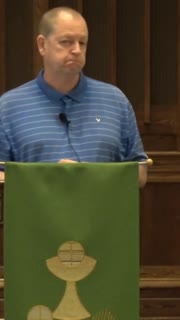Unity and Reconciliation in the New Covenant
Summary
### Summary
Today, we delved into the concept of the "New Covenant" as presented by Paul in his letters to the Corinthians. This term is crucial for understanding the unity and reconciliation efforts within the early church, which was a melting pot of diverse ethnic, religious, and social backgrounds. Paul’s mission was to bring together Jews, Gentiles, Messianic Jews, and pagan Greeks into one cohesive body of Christ, despite their differences and conflicts.
The New Covenant, as Paul describes, is not a replacement of the old covenants but a fulfillment and continuation of them. This covenant is deeply rooted in the Jewish tradition and is an extension of the covenants made with Noah, Abraham, Moses, and David. The term "New Covenant" can be misleading if interpreted as discarding the old covenants. Instead, it signifies a renewed relationship with God, grounded in the same foundational promises but written on our hearts, as prophesied by Jeremiah.
Paul reiterates the importance of communion as a covenantal act that binds Christians together. This act is a reaffirmation of our relationship with Christ and each other, transcending the conflicts and divisions that may arise. The New Covenant is about internalizing God's law and living it out in our daily lives, fostering unity and understanding among diverse communities.
We also touched on the strained relationship between Christians and Jews today, emphasizing the need for interfaith dialogue and reconciliation. The New Covenant calls us to a deeper understanding and respect for the foundational covenants that unite us, rather than creating divisions.
### Key Takeaways
1. Unity in Diversity: The early church in Corinth was a diverse community facing significant conflicts. Paul’s mission was to unify this diverse group under the body of Christ, emphasizing that the New Covenant calls for reconciliation and unity among believers from different backgrounds. [01:43]
2. Covenant as a Sacred Bond: A covenant is far more than a business transaction; it is a sacred bond that defines our relationship with God and each other. This bond is foundational to our faith, stretching from Genesis through Revelation, and is reaffirmed in the New Covenant through Christ. [07:35]
3. Fulfillment, Not Replacement: The New Covenant does not replace the old covenants but fulfills and continues them. It is grounded in the same promises made to Noah, Abraham, Moses, and David, and is written on our hearts, calling us to live out God's law in our lives. [11:33]
4. Communion as a Covenantal Act: Communion is a vital practice that reaffirms our relationship with Christ and each other. It is an act of covenant that transcends conflicts and divisions, reminding us of our unity in the body of Christ. [05:34]
5. Interfaith Reconciliation: The strained relationship between Christians and Jews today calls for renewed efforts in interfaith dialogue and understanding. The New Covenant invites us to respect and honor the foundational covenants that unite us, fostering peace and reconciliation. [18:23]
### YouTube Chapters
[0:00] - Welcome
[01:43] - Unity in Diversity
[03:38] - Addressing Conflicts
[05:34] - Communion as a Covenantal Act
[07:35] - Understanding Covenant
[09:31] - Fulfillment, Not Replacement
[11:33] - The New Covenant in Jeremiah
[13:32] - Written on Our Hearts
[15:33] - The Abrahamic Covenant
[17:24] - Contradictions in Hebrews
[18:23] - Interfaith Reconciliation
[18:56] - Reaffirming Jesus' Promises
Study Guide
### Bible Reading
1. Jeremiah 31:31-33: "The days are coming," declares the Lord, "when I will make a new covenant with the people of Israel and with the people of Judah. It will not be like the covenant I made with their ancestors when I took them by the hand to lead them out of Egypt, because they broke my covenant, though I was a husband to them," declares the Lord. "This is the covenant I will make with the people of Israel after that time," declares the Lord. "I will put my law in their minds and write it on their hearts. I will be their God, and they will be my people."
2. 1 Corinthians 11:23-26: For I received from the Lord what I also passed on to you: The Lord Jesus, on the night he was betrayed, took bread, and when he had given thanks, he broke it and said, "This is my body, which is for you; do this in remembrance of me." In the same way, after supper he took the cup, saying, "This cup is the new covenant in my blood; do this, whenever you drink it, in remembrance of me." For whenever you eat this bread and drink this cup, you proclaim the Lord's death until he comes.
3. Romans 9:4-5: The people of Israel. Theirs is the adoption to sonship; theirs the divine glory, the covenants, the receiving of the law, the temple worship and the promises. Theirs are the patriarchs, and from them is traced the human ancestry of the Messiah, who is God over all, forever praised! Amen.
### Observation Questions
1. What does Jeremiah 31:31-33 say about the nature of the new covenant? How is it different from the old covenant?
2. According to 1 Corinthians 11:23-26, what is the significance of communion in the context of the new covenant? [05:34]
3. In Romans 9:4-5, what are the key elements that belong to the people of Israel, and how do they relate to the covenants mentioned?
4. How does Paul address the conflicts within the early church in Corinth, and what role does the new covenant play in his approach? [01:43]
### Interpretation Questions
1. Why is it important to understand that the new covenant does not replace the old covenants but fulfills and continues them? How does this understanding affect our view of the relationship between the Old and New Testaments? [11:33]
2. How does the act of communion serve as a reaffirmation of our relationship with Christ and each other, according to the sermon? What does this imply about the importance of this practice in fostering unity? [05:34]
3. What are the implications of the new covenant being "written on our hearts" as mentioned in Jeremiah 31:33? How does this internalization of God's law influence our daily lives and interactions with others? [13:32]
4. How does the strained relationship between Christians and Jews today reflect the challenges Paul faced in unifying diverse groups in the early church? What lessons can we draw from Paul's approach to reconciliation? [03:38]
### Application Questions
1. Reflecting on the concept of "unity in diversity," how can we actively work towards reconciliation and unity within our own church community, especially when faced with conflicts and differences? [01:43]
2. Considering the sacred nature of a covenant, how can we deepen our understanding and commitment to our relationship with God and each other? What practical steps can we take to honor this sacred bond in our daily lives? [07:35]
3. How can we ensure that our practice of communion remains a meaningful reaffirmation of our covenant with Christ and each other, rather than just a ritual? What changes might we need to make in our approach to this practice? [05:34]
4. In what ways can we engage in interfaith dialogue and reconciliation efforts to address the strained relationship between Christians and Jews today? How can we promote understanding and respect for the foundational covenants that unite us? [18:23]
5. How can we internalize God's law and live it out in our daily lives, as described in Jeremiah 31:33? What specific actions can we take to ensure that our faith is reflected in our behavior and interactions with others? [13:32]
6. Reflect on a time when you experienced conflict within a diverse group. How did you handle it, and what could you have done differently to promote unity and understanding, in light of Paul's teachings? [01:43]
7. How can we educate ourselves and others about the historical and theological significance of the covenants mentioned in the sermon, to foster a deeper appreciation and respect for our shared faith heritage? [11:33]
Devotional
Day 1: Unity in Diversity
Paul's mission to the early church in Corinth was to unify a diverse community under the body of Christ. This community included Jews, Gentiles, Messianic Jews, and pagan Greeks, all of whom had different backgrounds and conflicts. The New Covenant calls for reconciliation and unity among believers, transcending these differences. It is a reminder that despite our diverse backgrounds, we are all part of one body in Christ, and our unity is a testament to the power of the New Covenant. [01:43]
1 Corinthians 12:12-13 (ESV): "For just as the body is one and has many members, and all the members of the body, though many, are one body, so it is with Christ. For in one Spirit we were all baptized into one body—Jews or Greeks, slaves or free—and all were made to drink of one Spirit."
Reflection: Think of someone in your church community who comes from a different background than you. How can you reach out to them this week to foster unity and understanding?
Day 2: Covenant as a Sacred Bond
A covenant is not merely a business transaction but a sacred bond that defines our relationship with God and each other. This bond is foundational to our faith, stretching from Genesis through Revelation. The New Covenant, reaffirmed through Christ, calls us to internalize God's law and live it out in our daily lives. This sacred bond is a reminder of our commitment to God and to each other, transcending any conflicts or divisions that may arise. [07:35]
Jeremiah 31:33 (ESV): "For this is the covenant that I will make with the house of Israel after those days, declares the Lord: I will put my law within them, and I will write it on their hearts. And I will be their God, and they shall be my people."
Reflection: Reflect on your relationship with God. How can you deepen this sacred bond in your daily life? What practical steps can you take to live out God's law written on your heart?
Day 3: Fulfillment, Not Replacement
The New Covenant does not replace the old covenants but fulfills and continues them. It is grounded in the same promises made to Noah, Abraham, Moses, and David. This covenant is written on our hearts, calling us to live out God's law in our lives. Understanding this helps us see the continuity of God's promises and the fulfillment of these promises through Christ. It is a call to embrace the fullness of God's plan and to live in a way that reflects His eternal promises. [11:33]
Matthew 5:17 (ESV): "Do not think that I have come to abolish the Law or the Prophets; I have not come to abolish them but to fulfill them."
Reflection: How do you see the fulfillment of God's promises in your life? What steps can you take to live in a way that reflects the continuity of God's plan?
Day 4: Communion as a Covenantal Act
Communion is a vital practice that reaffirms our relationship with Christ and each other. It is an act of covenant that transcends conflicts and divisions, reminding us of our unity in the body of Christ. This sacred act is a powerful reminder of the New Covenant and our commitment to live out God's law in our lives. It is a moment to reflect on our relationship with Christ and to renew our commitment to unity and reconciliation within the body of believers. [05:34]
1 Corinthians 10:16-17 (ESV): "The cup of blessing that we bless, is it not a participation in the blood of Christ? The bread that we break, is it not a participation in the body of Christ? Because there is one bread, we who are many are one body, for we all partake of the one bread."
Reflection: As you prepare for the next communion service, reflect on your relationship with Christ and with others in your church. How can you use this time to renew your commitment to unity and reconciliation?
Day 5: Interfaith Reconciliation
The strained relationship between Christians and Jews today calls for renewed efforts in interfaith dialogue and understanding. The New Covenant invites us to respect and honor the foundational covenants that unite us, fostering peace and reconciliation. This is a call to engage in meaningful conversations and to seek common ground, recognizing the shared heritage and promises that bind us together. It is an opportunity to build bridges and to work towards a deeper understanding and respect for each other's faith traditions. [18:23]
Romans 11:17-18 (ESV): "But if some of the branches were broken off, and you, although a wild olive shoot, were grafted in among the others and now share in the nourishing root of the olive tree, do not be arrogant toward the branches. If you are, remember it is not you who support the root, but the root that supports you."
Reflection: Think of a way you can engage in interfaith dialogue this week. How can you show respect and understanding towards someone of a different faith tradition? What steps can you take to foster peace and reconciliation?
Quotes
### Quotes for Outreach
1. "To be in a covenant relationship is far more significant than just a business transaction. It is a special bond, a sacred bond, and it needs to be understood for that. And of course, we know just how important the covenanted story is from Genesis right through into the ministry of Jesus, and then right through to the book of Revelation. Covenant is a word that weaves it all together." [07:35] (36 seconds)
2. "Paul is bringing us back to the very institution of communion that we read in Matthew, Mark, and Luke. And in fact, there's a lot of similarity in the way those words are presented in those three Gospels, with the exception of just one little piece of it. And that is this notion of the covenant. So in restating the litany that is in our Gospels, Paul is trying to reassert that fundamental moment where Jesus is in a covenantal relationship with his first disciples, his first followers." [05:34] (48 seconds)
3. "What does this word covenant mean? So in a couple of the texts, there is just the covenant that's entered into. But in other manuscripts, there is this new covenant. Well, which one is it? Because that's kind of a significant difference. Well, what is a covenant in the first place? Let's start with that. What is a covenant? I've talked to you a lot about covenant, because I think it's so essential. It's so fundamental to our Christian faith that we understand what that word must mean." [07:35] (36 seconds)
4. "When Jesus says, this cup is the new covenant, or this cup is the covenant in my blood, what is he referring to? He's referring specifically to the Mosaic covenant that is described in Exodus. Moses says the exact same thing. That covenant is a direct and an affirmation of the most important covenant, which is, of course, the covenant with Abraham. And in turn, the covenant with Abraham is built upon the foundation of God's covenant in Genesis that is enshrined with Noah." [09:31] (49 seconds)
5. "It's time for us to reaffirm the promises that are made by Jesus' own words and to remember that there is one everlasting covenant and we are all called to try and bring that into our lives." [18:56] (23 seconds)
### Quotes for Members
1. "Paul is faced with perspectives, from Jewish community in Corinth, pagan Greeks, Messianic Jews, so that's sort of something happening within parts of the Jewish community who were becoming Christ confessors, which would sort of become termed Messianic Jews, and Gentiles. So we've got all of this mixing together, and a lot of conflict is coming from that. Now, I've been thinking a lot in the last eight months about conflict across religious communities, across religious traditions. And I'm particularly concerned about relationship between Christians and Jews." [01:43] (53 seconds)
2. "So Paul is kind of, in his own way, offering us something that is very relevant for today. And he approaches this from a number of perspectives. So verses we didn't read, for example, address the whole question of head coverings. In sanctuary, this was being, this was emerging as a serious issue, with different religious traditions having different views about whether the head should be covered when you come into worship. And Paul tries to address this. And unfortunately, it has been another example of text that has been abused by people over the years to, I don't know, to a certain extent, assert their own power claim, if you like, about, you know, to the degree to which women should be, have their heads covered, and men should have their heads covered, and all this stuff going on." [03:38] (64 seconds)
3. "So you've got to understand the word covenant isn't, you know, a bunch of different relationships. It's one relationship that is formed, refashioned, and recommitted. But along comes this text that Paul talks to us about being a new covenant. Well, we hear the word new. What do you think? You think, well, it's out with the old and it's in with the new. And sadly, rather simplistic theological readings through the centuries have concluded that. And it has created literally centuries of conflict. Because to say it's a new covenant implies, well, all that other stuff doesn't matter anymore. You've got to embrace the new covenant." [09:31] (60 seconds)
4. "He says, Take note of that. What is that new covenant with? It's with Israel. That kingdom that is expressed through Israel and Judah. It will not be like the covenant that I made with their ancestors when I took them by the hand to bring them out of the land of Egypt. A covenant that they made with their ancestors when I took them by the hand to bring them out of the land of Egypt. It broke. But this is the covenant that I will make with the house of Israel. After those days, says the Lord, I will put my law, that's your Torah law, I will put my law within them and, so this is the new piece, I will write it on their hearts. I will be their God, and they shall be my people." [13:32] (73 seconds)
5. "And you see where this notion of new covenant really is grounded. It's grounded in all of the foundation that came before it. It's a recognition that we as humans can keep on messing this up, we keep breaking our covenant with God, and God keeps on trying to come up with ways to bring us back into union with God. that's the covenant that is being referred to by Paul it's written on their that's that's the Jewish community first it is written on their hearts and Jesus takes that and calls takes that foundation and calls the rest of the world into that covenant it is not a replacement of what God did through Abraham." [15:33] (60 seconds)










